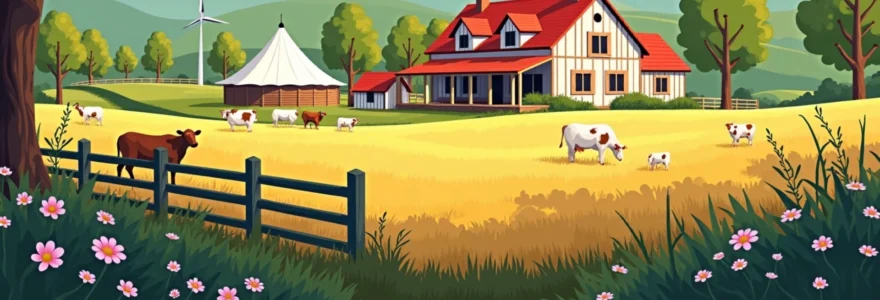As urban dwellers increasingly seek respite from the hustle and bustle of city life, farm stays have emerged as a popular choice for those craving an authentic rural experience. This trend towards agritourism not only offers visitors a unique holiday but also provides farmers with a valuable opportunity to diversify their income streams. From converted barns to luxury glamping sites, farm stays are revolutionizing the way people connect with the countryside, offering a blend of rustic charm and modern comfort.
Agritourism trends: the rise of farm stays in rural britain
The concept of farm stays has gained significant traction in recent years, with more and more British farms opening their gates to tourists. This surge in popularity can be attributed to several factors, including a growing interest in sustainable tourism, a desire for experiential travel, and an increased awareness of the importance of supporting local agriculture. According to recent statistics, the UK farm stay market has seen a 30% increase in bookings over the past five years, indicating a robust and growing demand for this type of accommodation.
Farm stays offer visitors a unique opportunity to immerse themselves in rural life, providing a stark contrast to traditional hotel experiences. Guests can wake up to the sound of roosters, participate in farm activities, and enjoy fresh, locally sourced produce. This hands-on approach to holidays appeals to families looking to educate their children about food production, couples seeking a romantic countryside retreat, and solo travelers interested in learning new skills.
Moreover, the COVID-19 pandemic has accelerated the trend towards domestic tourism, with many Britons opting for staycations over international travel. Farm stays have benefited from this shift, as they offer spacious, outdoor environments that align with social distancing guidelines and provide a safe haven for those looking to escape crowded urban areas.
Diversification of farm income through hospitality services
For farmers facing economic challenges due to fluctuating commodity prices and changing agricultural policies, diversifying into tourism has become an attractive option. By opening their farms to visitors, agriculturists can create additional revenue streams that complement their traditional farming activities. This diversification not only helps to stabilize farm incomes but also contributes to the preservation of rural landscapes and communities.
Converting outbuildings: barns to boutique accommodations
One of the most popular ways farmers are venturing into hospitality is by converting unused outbuildings into comfortable accommodations. Old barns, stables, and granaries are being transformed into charming cottages and apartments, often retaining original features such as exposed beams and stonework. These conversions not only provide unique lodging options for guests but also breathe new life into historic farm structures.
The process of converting outbuildings requires careful planning and often significant investment. However, the potential returns can be substantial. A well-executed barn conversion can command premium rates, especially when equipped with modern amenities such as underfloor heating, luxury bathrooms, and high-speed internet. This blend of rustic charm and contemporary comfort is particularly appealing to urban visitors seeking an authentic farm experience without sacrificing creature comforts.
Integrating glamping options: yurts, shepherds huts, and treehouses
For farms with limited existing structures or those looking to minimize initial investment, glamping offers an attractive entry point into the hospitality sector. Glamping, or glamorous camping, provides guests with the experience of outdoor living coupled with the luxuries of a hotel stay. Yurts, shepherds huts, and treehouses are becoming increasingly popular options, offering unique accommodation that connects visitors with nature.
These structures can be strategically placed to maximize views of the surrounding countryside, providing guests with an immersive rural experience. Many farms are finding success by offering a range of glamping options to cater to different preferences and group sizes. For example, a farm might offer cozy shepherds huts for couples alongside larger yurts for families, creating a diverse and appealing accommodation portfolio.
Farm-to-table experiences: on-site restaurants and cooking classes
Another way farms are diversifying their offerings is through food-related experiences. On-site restaurants showcasing produce grown on the farm have become a major draw for foodie tourists. These establishments often operate on a true farm-to-table model, with menus changing seasonally based on what’s available from the farm.
In addition to restaurants, many farms are offering cooking classes and workshops. These hands-on experiences allow guests to learn about local ingredients, traditional cooking methods, and sustainable food practices. From cheese-making workshops to bread-baking classes, these activities not only provide an additional revenue stream but also help to educate visitors about the importance of local food systems.
Educational components: animal care workshops and crop harvesting activities
Farm stays are increasingly incorporating educational elements into their offerings, recognizing the value of experiential learning. Animal care workshops allow guests to participate in activities such as feeding livestock, collecting eggs, or even assisting with lambing during the appropriate season. These experiences are particularly popular with families, providing children with hands-on learning opportunities about animal husbandry and farm life.
Crop harvesting activities offer another educational avenue. Depending on the season, guests might have the opportunity to pick berries, harvest vegetables, or participate in grape picking for wine production. These activities not only provide valuable insight into agricultural practices but also foster a deeper appreciation for the work that goes into food production.
Farm stays offer a unique blend of education and relaxation, allowing guests to learn about agriculture while enjoying the tranquility of the countryside.
Sustainable tourism practices in farm stay operations
As the demand for eco-friendly travel options grows, many farm stays are placing a strong emphasis on sustainability. This focus not only aligns with the values of environmentally conscious travelers but also helps to reduce operational costs and preserve the natural beauty of rural areas.
Renewable energy implementation: solar panels and biomass heating
A significant number of farm stays are investing in renewable energy sources to power their operations. Solar panels are becoming increasingly common, taking advantage of the open spaces available on farms to generate clean electricity. Some farms are even offering tours of their solar installations, educating guests about renewable energy technologies.
Biomass heating systems are another popular choice, particularly in areas with abundant wood resources. These systems use agricultural waste or sustainably sourced wood to provide heating and hot water, reducing reliance on fossil fuels and creating a closed-loop energy system on the farm.
Water conservation techniques: rainwater harvesting and greywater systems
Water conservation is a critical aspect of sustainable farm stay operations. Many properties are implementing rainwater harvesting systems to collect and store rainwater for non-potable uses such as irrigation and toilet flushing. This not only reduces the demand on local water supplies but also helps to manage stormwater runoff.
Greywater systems are also gaining traction, allowing water from sinks and showers to be treated and reused for irrigation. These systems not only conserve water but also demonstrate to guests the importance of responsible water management in agriculture.
Organic farming methods: pesticide-free produce and ethical animal husbandry
Many farm stays are adopting organic farming practices, eschewing synthetic pesticides and fertilizers in favor of natural alternatives. This approach not only produces healthier food for guests but also protects local ecosystems and biodiversity. Visitors often have the opportunity to learn about organic farming methods through guided tours or hands-on workshops.
Ethical animal husbandry is another key component of sustainable farm stays. Properties that raise livestock often emphasize free-range practices and high animal welfare standards. This commitment to ethical farming not only appeals to conscientious travelers but also results in higher quality produce for on-site restaurants and farm shops.
Waste reduction strategies: composting and recycling programmes
Effective waste management is crucial for sustainable farm stay operations. Many properties have implemented comprehensive recycling programs, often educating guests about proper waste sorting. Composting is widely practiced, with food waste from kitchens and restaurants being turned into nutrient-rich soil for the farm.
Some innovative farms are even exploring anaerobic digestion systems, which convert organic waste into biogas for energy production. These closed-loop systems demonstrate the potential for farms to operate with minimal waste output, setting an example for sustainable living.
Regulatory framework and certification for UK farm stays
As the farm stay sector continues to grow, it’s important for operators to navigate the regulatory landscape and adhere to relevant standards. In the UK, farm stays must comply with various regulations, including health and safety standards, food hygiene rules (if serving meals), and planning permissions for any new structures or conversions.
Several certification schemes are available for farm stays looking to demonstrate their commitment to quality and sustainability. The Green Tourism Business Scheme is one such program, offering a recognized certification for environmentally friendly tourism businesses. Additionally, the Farm Stay UK organization provides a quality assurance scheme specifically for farm-based accommodation.
Obtaining relevant certifications not only ensures compliance with industry standards but also serves as a marketing tool, reassuring potential guests of the quality and sustainability of the accommodation. As the sector matures, it’s likely that certification will become increasingly important for differentiation in a competitive market.
Technology integration in modern farm stay management
While farm stays offer a return to nature, many are embracing technology to enhance guest experiences and streamline operations. From booking platforms to farm management software, technology is playing an increasingly important role in the success of farm stay businesses.
Online booking platforms: integration with airbnb and booking.com
To reach a wider audience, many farm stays are listing their properties on popular online booking platforms such as Airbnb and Booking.com. These platforms provide exposure to a global market of potential guests and offer tools for managing bookings and communications. However, farm stay operators must balance the benefits of these platforms with the need to maintain direct relationships with guests and control over their brand identity.
Farm management software: crop planning and livestock tracking apps
Modern farm management software is helping farmers to optimize their agricultural operations alongside their hospitality ventures. Apps for crop planning and livestock tracking allow farmers to efficiently manage their core business while dedicating time to guest services. Some innovative farm stays are even incorporating these technologies into guest experiences, offering visitors insights into modern agricultural practices through interactive demonstrations.
Guest experience enhancement: virtual farm tours and interactive digital maps
Technology is also being used to enhance the guest experience before and during their stay. Virtual farm tours allow potential visitors to explore the property online, helping them to make informed booking decisions. Once on-site, interactive digital maps can guide guests through self-guided tours of the farm, providing information about different areas and activities.
Social media marketing: instagram-worthy moments and influencer partnerships
Social media has become a powerful marketing tool for farm stays, with many properties creating Instagram-worthy settings to encourage guest sharing. From picturesque picnic spots to animal interaction opportunities, these moments help to spread awareness organically. Some farm stays are also partnering with influencers to reach new audiences, showcasing the unique experiences available on their properties.
Case studies: successful farm stays across the UK
Examining successful farm stays provides valuable insights into the diverse approaches being taken across the UK. These case studies highlight the innovation and adaptability of farmers in creating unique hospitality offerings.
Feather down farm days: luxury camping on working farms
Feather Down Farm Days has pioneered a network of luxury camping experiences on working farms across the UK. Their model provides farmers with pre-fabricated canvas lodges and marketing support, allowing them to quickly enter the hospitality market with minimal upfront investment. This approach has proven successful in attracting urban families looking for an authentic farm experience combined with comfortable accommodation.
Soho farmhouse: high-end agrarian retreat in the cotswolds
At the luxury end of the spectrum, Soho Farmhouse in Oxfordshire demonstrates how agricultural settings can be transformed into exclusive retreats. While not a traditional working farm, this members’ club and hotel incorporates many farm-inspired elements, from its rustic-chic design to its kitchen gardens and on-site dairy. The success of Soho Farmhouse highlights the appeal of rural aesthetics to high-end travelers.
Cwmcrwth farm: welsh smallholding offering hands-on farming experiences
Cwmcrwth Farm in Wales offers a more hands-on approach to farm stays. This small family-run farm allows guests to participate in daily farming activities, from feeding animals to helping with the harvest. By focusing on educational experiences and sustainable practices, Cwmcrwth has created a loyal following among families and school groups interested in learning about small-scale agriculture.
The garlic farm: isle of wight’s agritourism pioneer
The Garlic Farm on the Isle of Wight has successfully combined agricultural production with tourism. Known for its garlic products, the farm has expanded into offering accommodation, a restaurant, and educational tours. Their approach demonstrates how specializing in a particular crop can create a unique identity that attracts visitors interested in both culinary and agricultural experiences.
These diverse case studies illustrate the range of possibilities within the farm stay sector, from luxury retreats to hands-on agricultural experiences.
As the farm stay sector continues to evolve, it’s clear that the combination of agricultural heritage, sustainable practices, and modern hospitality is creating compelling experiences for travelers. By offering authentic connections to rural life and food production, farm stays are not only providing unique holiday options but also supporting the preservation of Britain’s agricultural landscapes and traditions. The future of farm stays looks bright, with continued innovation and adaptation likely to drive further growth in this exciting sector of the tourism industry.


